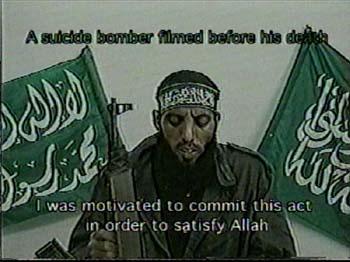 "If terrorists have seized control of the world narrative, if they have captured the historical imagination, have they become, in effect, the world's new novelists?" The New York Times' Lorrie Moore wrote this in 1991, but, with suicide bombings happening with alarming frequency—nearly daily in Iraq or the Middle East—and, in the cases of Egypt and London, in places rarely rocked by such explosions, her question is timely. It's a notion culled from the Don DeLillo novel she was reviewing, Mao II, which has its protagonist musing:
"If terrorists have seized control of the world narrative, if they have captured the historical imagination, have they become, in effect, the world's new novelists?" The New York Times' Lorrie Moore wrote this in 1991, but, with suicide bombings happening with alarming frequency—nearly daily in Iraq or the Middle East—and, in the cases of Egypt and London, in places rarely rocked by such explosions, her question is timely. It's a notion culled from the Don DeLillo novel she was reviewing, Mao II, which has its protagonist musing:There's a curious knot that binds novelists and terrorists. In the West we become famous effigies as our books lose the power to shape and influence.... Years ago I used to think it was possible for a novelist to alter the inner life of the culture. Now bomb-makers and gunmen have taken that territory. They make raids on human consciousness. What writers used to do before we were all incorporated.While many people now are pondering what makes suicide bombers tick, from Time reporter Aparisim Ghosh's rare glimpse into the mind of a bomber-to-be in Iraq (his pseudonym, Abu Ubeida al-Jarrah, uses the name of a 7th-century general who overthrew Syria for Islam) to Hany Abu-Assad's film Paradise Now, which will screen at the Walker in October (details to come), others are wondering how these tactics are rewriting our narratives. Douglas Rushkoff, author of Coercion and Media Virus, blogs:
Suicide bombing is a media virus with very real effects. The sticky outer shell is the event itself - a suicide bombing gets covered on the news. It's huge news, especially if it occurs in a white western nation. Currently, it's the fastest spreading kind of news story there is.And Harper's editor and author of the new book Mediated, Thomas de Zengotita, wonders aloud:
The code, like that of any successful media virus, challenges the unarticulated confusion over the relationship of the west to oil, Arabs, Islam, and post-colonialism. Actually, the virus fuels itself on rage going back as far as the Crusades, or certainly since the imposition of CIA-sponsored dictatorships."
I've been thinking and writing about performative self-consciousness in a mediated age for the last five years or so, and I have this question which I've scarcely dared to formulate so unlikely does it seem. I'm wondering if "playing a starring role" could be part of the motive for suicide bombers, not the whole motive, obviously, but part? At first I recoil from the thought—nobody needs attention that much! But then I remember Columbine and I remember the video record of themselves that the shooters compiled—I saw some of those tapes, and this is my native culture, and I've taught High School, and I know those kids were starring in their own show. So I'm asking...is there anything like a culture of performance at work in the worlds of suicide bombers?
[Cross-posted at the Walker Film/Video blog.]
No comments:
Post a Comment